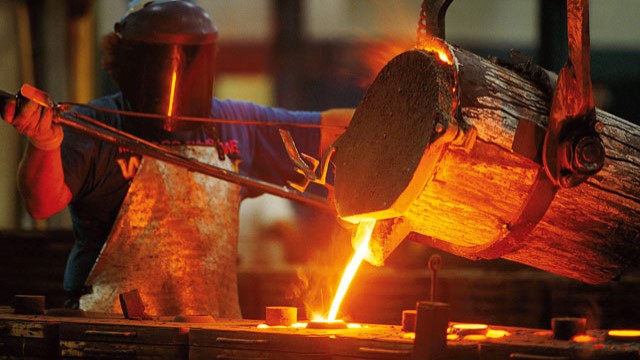Steel forming and finishing
Transforming semi-finished casting products, such as steel slabs and billets, into finished steel plates, sheets and beams is a complex process involving vast amounts of heat. Alfa Laval has smart, energy-saving equipment, systems and services for hot and cold rolling mills. These improve the overall mill efficiency and yields.
Shaping the future of steel
Today’s steel helps shape the future. But shaping steel is vital to the future of steel producers. Alfa Laval has a broad range of equipment and services that help hot and cold rolling mills deal with the challenges that steelmakers face:
Morg oil system/Cleaning contaminated oils
Not only are industrial oils used in steelmaking expensive to buy, but they are also even more expensive to dispose of once they become contaminated with particles and other impurities during the forming and finishing processes. Alfa Laval disc stack centrifuges are ideal for cleaning such oils because they effectively remove both particles and water from the oil in a single operation. Ensuring that the oils used in mill processes are always clean leads to substantial savings due to lower purchase and disposal costs, minimal downtime and reduced equipment wear and corrosion. This generally translates into fast return on investment.
Tandem cold rolling mill cleaning
Cold rolled processes normally require large amounts of oily lubricants. After each operation, the oil must be removed and cleaned in order to avoid creation of fire hazards from flammable scum. Installing Alfa Laval rotary cleaning equipment to clean the spent oil significantly reduces the amount of flammable sedimentation scum and cuts the cleaning time between milling operations. This eliminates the need for manual cleaning, saving you time and money.
Scale recycling
Cleaning and cooling during the forming and finishing processes consumes large amounts of water. Examples include scale removal prior to hot rolling, cooling during cool rolling, and pickling – the final cleaning of finished products. This means water recycling is crucial for production economy as well as for emissions reduction. Decanter centrifuges offer the best way to clean slurries in steel forming and finishing processes of scale and iron oxide particles.
Closed loop cooling systems
Well-designed cooling systems are vital given the complex processes and operating conditions encountered in blast, basic oxygen and electric arc furnaces, direct reduction plants and continuous casting machinery.
In a closed-loop cooling system, high-quality water is cooled in a secondary cooling system, which consists of plate heat exchangers cooled by seawater, river water or a water from a nearby cooling tower, which:
- Reduces maintenance due to the use of easy-to-maintain Alfa Laval plate heat exchangers
- Lowers pumping costs because pumps only need to overcome the static head of the process equipment rather than the full cooling tower.
Air cooler as secondary cooling system
Because water is an increasingly scarce resource, it is vital for steelmakers to look for alternative cooling systems. Closed loop air cooling systems are an effective alternative to cooling towers that eliminate both the problems and costs associated with water treatment and makeup water. Alfa Laval air coolers combine high efficiency with low electricity consumption and noise levels.
Pickling line
In order to remove impurities and various oxides, the surface of the steel is treated in the pickling line. Various types of pickling processes using different pickling acids are available to treat SS grade and CS grade steel. Graphite is virtually the only material suitable for the heat exchangers used in the highly corrosive environments of the pickling baths.
The Alfa Laval Diabon plate heat exchanger features plates made of a special graphite material capable of withstanding both stainless steel and carbon steel pickling fluids.

